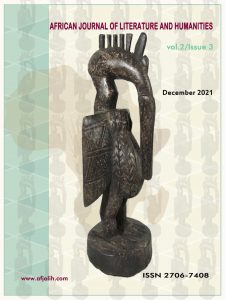Scientific Committee
– Professeur Adama COULIBALY, Université Félix Houphouët Boigny (Côte d’Ivoire)
– Professeur Bi Irié Ernest TOUOUI, Université Félix Houphouët Boigny (Côte d’Ivoire)
– Professeur Bienvenu KOUDJO, Université d’Abomey-Calavi (Bénin)
– Professeur Cécile Dolisane EBOSSE, Université de Yaoundé1 (Cameroun)
– Professeur Clément DILI PALAÏ Clément, Université de Maroua (Cameroun)
– Professeur Daouda COULIBALY, Université Alassane Ouattara (Côte d’Ivoire)
– Professeur Emmanuel MATATEYOU, Université de Yaoundé1 (Cameroun)
– Professeur Eunice NGONGKUM, Université de Yaoundé1(Cameroun)
– Professeur Gabriel KUITCHE FONKOU, Université de Dschang (Cameroun)
– Professeur Gérard-Marie MESSINA, Université de Yaoundé 1 (Cameroun)
– Professeur Kasimi DJIMAN, Université Félix Houphouët Boigny (Côte d’Ivoire)
– Professeur Logbo BLEDE, Université Félix Houphouët Boigny (Côte d’Ivoire)
– Professeur Mamadou KANDJI, Université Chieck Anta Diop (Sénégal)
– Professeur Nol Alembong, Université de Buea (Cameroun)
– Professeur Obou LOUIS, Université Félix Houphouët Boigny (Côte d’Ivoire)
– Professeur Pascal Okri TOSSOU, Université d’Abomey-Calavi (Bénin)
– Professeur Pierre MEDEHOUEGNON, Université d’Abomey-Calavi (Bénin)
Editorial Board
Dr Aboubakar Sidiki COULIBALY, Université de Bamako (Mali)
Dr Adama SORO, Université Alassane Ouattara (Côte d’Ivoire)
Dr Bi Boli Dit Lama GOURE, I N.P H.B, Yamoussoukro (Côte d’Ivoire)
Dr Evrard AMOI, Université Péléforo Gon Coulibaly (Côte d’Ivoire)
Dr Idrissa Soyiba TRAORE (MC), Université de Bamako (Mali)
Dr Lèfara SILUE (MC), Université Félix Houphouët Boigny (Côte d’Ivoire)
Dr. Mea KOUA, Université Félix Houphouët Boigny (Côte d’Ivoire)
Dr Moussa COULIBALY (MC), Université Félix Houphouët Boigny (Côte d’Ivoire)
Dr Paul SAMASIA, Chargé de cours, Université de Yaoundé1 (Cameroun)
Dr Pierre Suzanne EYENGA ONANA (MC), Université de Yaoundé1 (Cameroun)
AFRICAN LITERATURE AND THE REPRESENTATION OF THE STRANGER: A READING OF AMA ATA AIDOO’S THE DILEMMA OF A GHOST AND ANOWA, OKOT p’BITEK SONG’S LAWINO AND WOLE SOYINKA’S THE LION AND THE JEWEL
SILUE LEFARA
Université Félix Houphouët-Boigny, Cocody-Abidjan.
lefaras@yahoo.com
ABSTRACT
In this paper, the local people regard the stranger as someone who comes from abroad. As such, the stranger is different from them because he does not speak their language and he does not know their tradition and their custom. The stranger is also perceived as a character that can do good and evil. His presence in the village is both a source of hope and despair. In African collective consciousness, to be the stranger of someone is a privilege, a wealth and even a blessing for a stranger does not come into the compound of every villager. In other words, the stranger is welcomed if he does not turn himself into a hindrance for the wellbeing of the clan. He can see and hear everything but he has no right to utter a word. Moreover, despite the willingness of the villagers to live in harmony with the stranger, his aggressive words may reveal him as a worst enemy of the clan. In the plot, Ato, Lakunle and Lawino act as internal strangers. These “been-toes” should favor the dialogue between modernity and tradition. Unfortunately, they are the promoters of western civilization. The writing of otherness is then a writing of self-appropriation. Key-words: aggressiveness, dialogue, harmony, mask, self, stranger, writing.
RÉSUMÉ
Dans cet article, les autochtones considèrent toute personne qui vient d’ailleurs comme un étranger. Par conséquent, l’étranger est différent d’eux parce qu’il ne parle pas leur langue et il ne connaît pas non plus leur tradition et leurs coutumes. L’étranger est aussi perçu comme un personnage qui peut faire le bien et le mal. Sa présence dans le village est à la fois une source d’espoir et de désespoir. Dans la conscience collective africaine, être l’étranger de quelqu’un est un privilège, une richesse voire une bénédiction car un étranger n’atterrit pas dans la concession de n’importe quel villageois. Autrement dit, l’étranger est bien venu, s’il ne se transforme pas en un obstacle au fonctionnement normal du clan. Il peut donc tout voir, tout entendre mais sans rien dire. Par ailleurs, malgré la bonne volonté des villageois de vivent en harmonie avec l’étranger, son agressivité verbale le dévoile comme un pire ennemis du clan. Dans le récit Ato, Lakunle et Lawino agissent comme des étrangers internes. Ces intellectuels africains devraient favoriser le dialogue entre le modernisme et la tradition. Malheureusement, ils sont les promoteurs de la civilisation occidentale. L’écriture de l’altérité est donc une écriture d’appropriation de soi. Mots-clés: agressivité, dialogue, harmonie, masque, soi, étranger, écriture.




